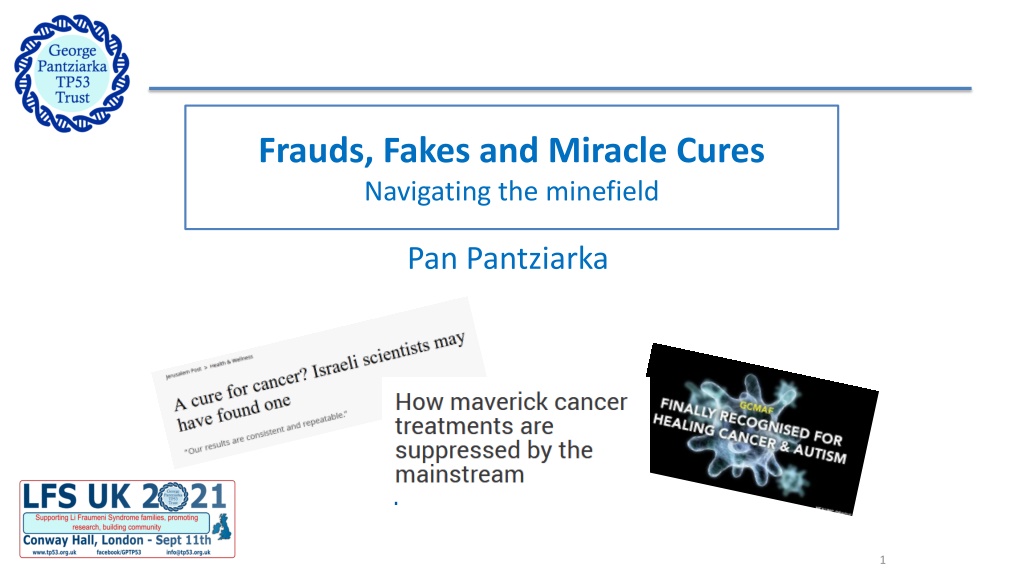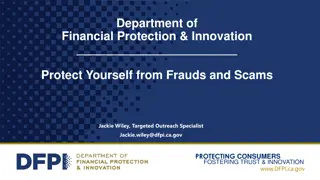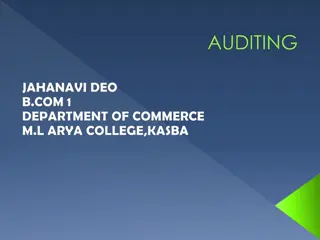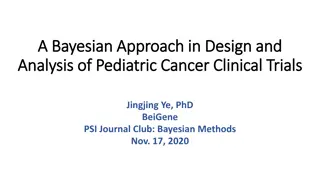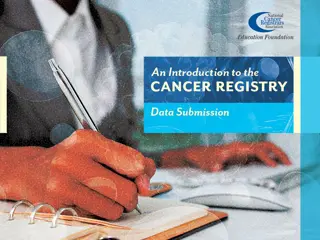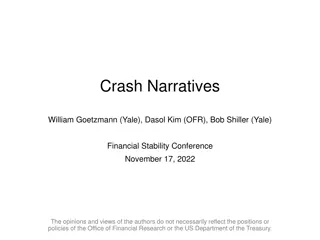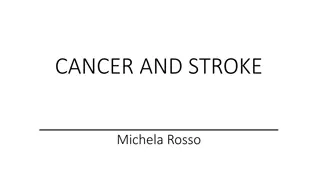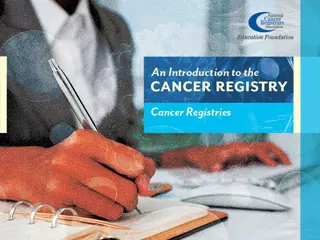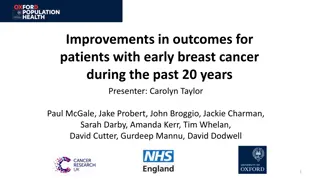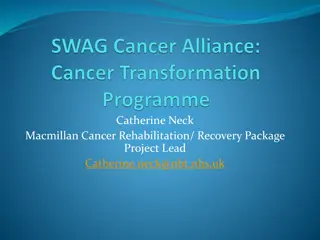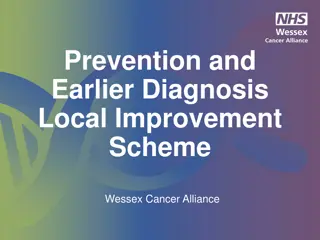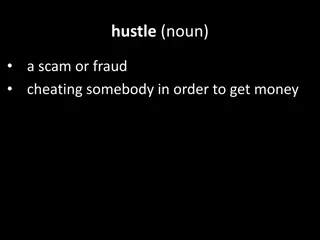Navigating the Minefield of Frauds, Fakes, and Miracle Cures in Cancer Narratives
Exploring the myths and realities surrounding cancer cures and causes, delving into the importance of evidence-based practices over sensationalized stories. Emphasizing the distinction between relative and absolute risk in cancer research.
- Cancer Narratives
- Evidence-Based Practices
- Cancer Cures
- Relative vs Absolute Risk
- Media Sensationalism
Download Presentation

Please find below an Image/Link to download the presentation.
The content on the website is provided AS IS for your information and personal use only. It may not be sold, licensed, or shared on other websites without obtaining consent from the author. Download presentation by click this link. If you encounter any issues during the download, it is possible that the publisher has removed the file from their server.
E N D
Presentation Transcript
Frauds, Fakes and Miracle Cures Navigating the minefield Pan Pantziarka 1
Common Themes X cures cancer X = cannabis, curcumin, vitamin C, chlorine dioxide, special diets Y causes cancer Y = microwaves, mobile phones, the wrong diet, vitamin C Z prevents cancer Z = cannabis, super-foods, aspirin, exercise 2
Evidence? The first question to ask is always where s the evidence ? This applies whether the story comes from a tabloid, a posh paper, the BBC or even a scientist If a story sounds too good to be true then alarms bells should be ringing! Randomised Controlled Trial Most stories in the press aren t even in the bottom level of the pyramid 3
Substance X cures cancer These stories mostly come in two types Personal anecdote someone with cancer was cured because they used a certain supplement, food, life-style etc Laboratory story cancer cells or mice with cancer were cured with a certain chemical or food In both cases the idea is that a complex disease like cancer can be cured by the addition of a single substance Digging into the personal anecdotes usually shows the person had lots of other treatments including standard chemo, radiotherapy etc In some cases these stories are faked from beginning to end there was no cancer to begin with! The laboratory stories are not more trustworthy because they re published by scientists. Just about everything kills cancer cells in a petri dish! Remember people are not mice! Many lab mice are not a good model for real cancers These stories are below or on the lowest rung of the evidence pyramid 4
Substance X causes cancer This is a very popular story in the media usually with alarming headlines to add to your stress levels Often based on scientific studies which track large populations to see if a given food, life-style, star-sign or something else is associated with increased cases of cancer Beware of how stats are reported relative risk is not the same as absolute risk 5
Relative risk vs. Absolute risk Source: BBC website A fast read of these articles can make you think that eating a couple of extra rashers of bacon a day raises your risk of bowel cancer to 20% The overall risk of bowel cancer in the UK is actually 6% - raising that by 20% makes it 7.2% So out of 100 daily bacon eaters, we would expect 1 extra case of bowel cancer in their lifetimes Always look at how these risks are phrased! Most alarming headlines turn out to be fairly boring once you look at absolute risks 6
Substance X prevents cancer There are two common sources for these stories Laboratory studies in mice Observational studies in people Repeat after me: A lab mouse is not a good model for a human These studies might be useful for generating new research ideas but not as a basis for life-style advice for people Observational studies are based on comparing different groups of people to see if they differ in cancer incidence How can you tell that the two groups are really comparable? Again possibly useful as a staring point for more research These studies are low on the pyramid but can feed in to the design of clinical trials 7
Red flags: Conspiracy theories The idea that governments and Big Pharma have a cure for cancer and are keeping it hidden is very common on some alternative medicine websites and forums Of course it s not such a secret that people running these sites know about it and will often sell you the cure for vast sums of money Treatments should be assessed on the basis of evidence but making up conspiracy theories helps explain a lack of evidence Often include attacks on current treatments and sometimes urge people to stop or delay their treatment because it interferes with whatever cure they are selling Nobody is saying that pharma companies are squeaky clean but if a cure really existed think how much fame and money would result, it would make every other drug success pale into insignificance! Conspiracy theories are designed to sow doubt not to enlighten 8
Red flags: Selling product Lots of alternative treatments are linked to specific supplements and supplement companies It s not just supplements and drugs there are all kinds of expensive devices and gadgets out there claiming to treat or prevent cancer Beware of scientific sounding evidence used to sell these products remember there s a huge chasm from a study in a test tube to treating a real cancer Faked studies or lists of hundreds of papers proving a treatment works are designed to blind with science rather than to genuinely enlighten you It s a sad fact but there are lots of people only too willing to fleece desperate cancer patients and their families 9
Red flags: Trust THE SCIENCE Scientists are people too they can exaggerate, lie, cheat, and do all the things that everyone else does Fake data and outright fraud are real problems, even in oncology Fake journals (known as predatory journals) are a growing problem Anyone who talks about The Science is either a politician or someone looking to appeal to authority Scientists can hype up results as much as anyone else! 10
Red flags: Cure-alls Cancer is a set of over 200 diseases no single treatment is ever likely to treat all of them Be sceptical of anything claiming to be the CURE! A drug that can treat all cancers and a ton of other diseases is closer to magic than to a real medicine Diseases We Help Cancers We Help Abscess Acne ADD ADHD Allergies Ampiginous Choroidopathy Asthma Autism Auto-Immune Diseases CFS/ME Chemical Sensitivity Cirrhosis of liver Colitis COPD Crohns Cystitis Cysts Dementia Depression Dupuytrens Contractions EBV Epstein-Barr Virus Eczema Fibromyalgia Flu Food Allergies Hepatitis B & C Herpes Hives IBS Immune System Damage Infections Inflammation LMBBS Lupus Lyme Macular Degeneration Multiple Sclerosis Nueropathy Osteoporosis Parkinsons Peridontal disease Polymyalgia Preventative / Prophylactive Psoriasis Rheumatoid Arthritis Root canal infections Sinusitis Toxins, Heavy Metal & Radiation Vaccine damage Wound healing Other Asbestostosis Bile Duct Bladder Bowel cancer Brain cancers Breast Cancer Cancer lymph nodes Basal cell carcinoma Colon Cancer Colorectal cancer Endometrial cancer Esophageal cancer Gall bladder Gastric cancer Gioblastoma Kidney cancer Leiomyosarcoma Liver cancer Lung cancer Melanoma Merkel Cell Mesothelioma cancer Neuroblastoma Oral cancers Ovarian Cancer Pancreatic cancer Pelvic cancer Peritoneal cancer Prostate Cancer Rectal cancer Rhabdomayosarcoma Stomach Testicular cancer Throat cancer Tongue cancer Uterine cancer Vaginal cancers Womb cancer Cancer 11
A case study Conclusion: HYPE!! 12
The Golden Rules Stay sceptical! Check multiple sources for information There is no such thing as The Science science is an evolving process not a fixed body of facts or a set of institutions Remember people are not mice! Keep the pyramid of evidence in mind most media stories don t even get onto the bottom rung Remember: extraordinary claims require extraordinary evidence Finally this doesn t mean everything you ever read is wrong! It just takes some work to find the evidence 13
